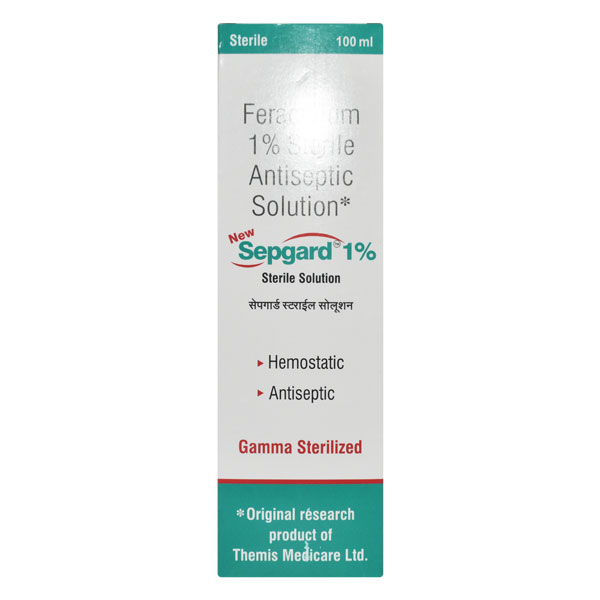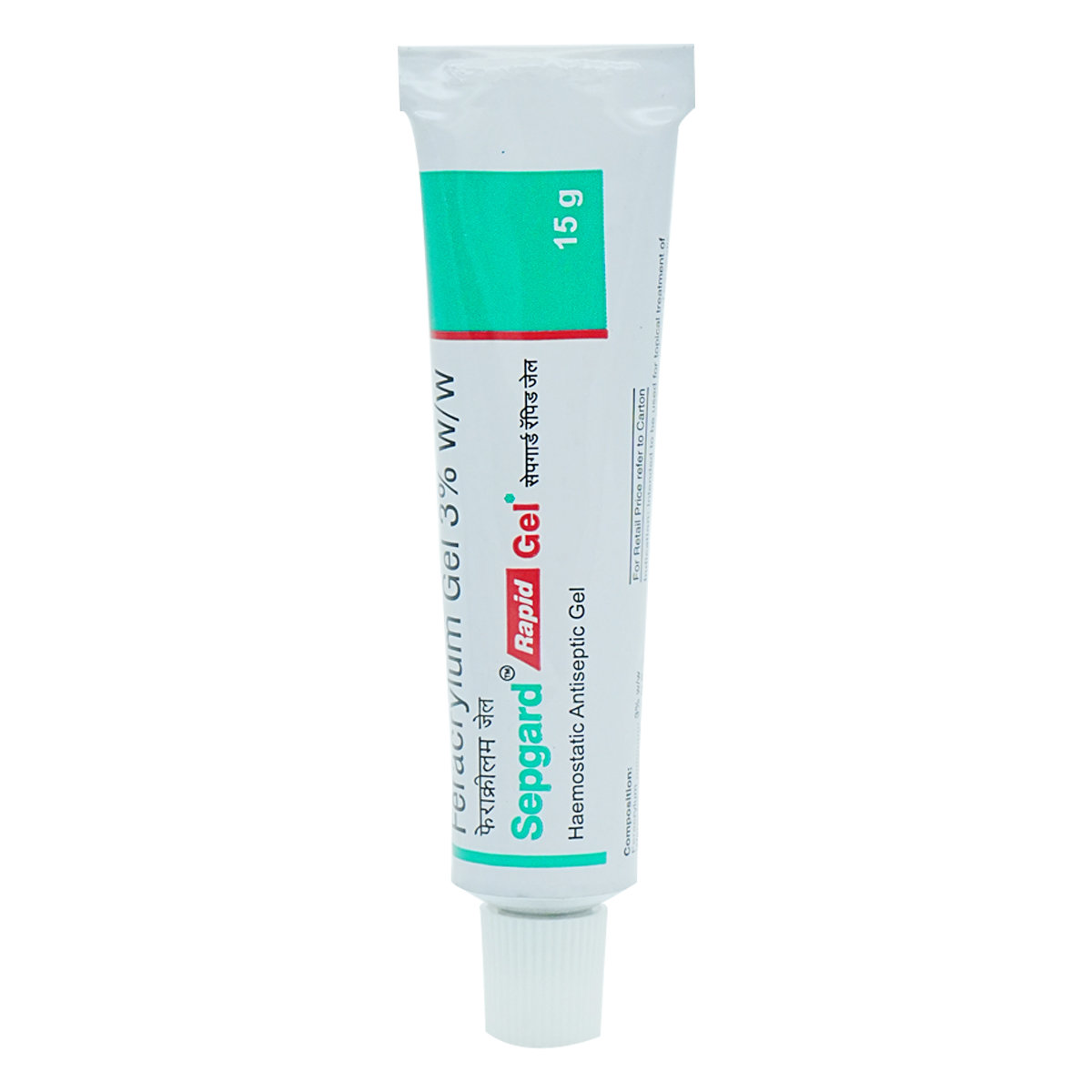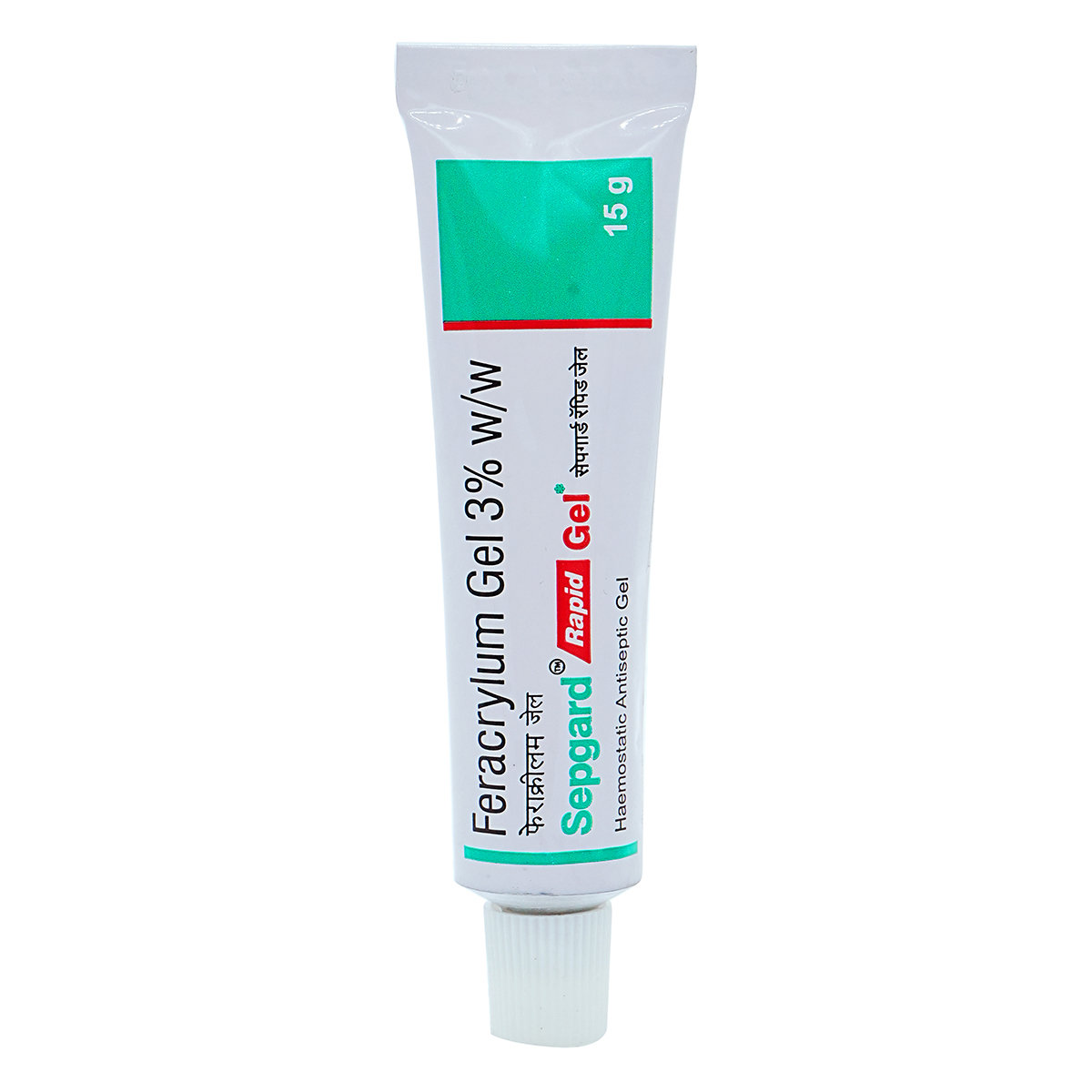Feracrylum
About Feracrylum
Feracrylum belongs to the class of ‘hemostatic agents’ (bleeding controlling) primarily used to treat bleeding from wounds and burns. It also acts as an antiseptic and prevents infection in post-operative wounds, cuts, burns, and abrasions.
Feracrylum contains ‘Feracrylum.’ It is a local hemostatic and topical antiseptic. It exerts antimicrobial action against gram-positive and gram-negative bacteria and fungi to prevent wound infection. It works by forming a complex with albumin protein and promotes clot formation to prevent bleeding.
Use Feracrylum as prescribed by your doctor. The common side effects of Feracrylum include a burning sensation and irritation at the application site. These side effects do not require medical attention and gradually resolve over time. However, if the side effects are persistent, reach out to your doctor.
Feracrylum is for topical (for skin) use only. Avoid contact with eyes and mouth. Let your doctor know if you are allergic to Feracrylum or have kidney/liver diseases before using. Feracrylum should be used during pregnancy and breastfeeding only if the doctor has prescribed it. It is advised to seek medical advice to limit/avoid alcohol consumption while using Feracrylum. This medicine usually does not affect your driving ability. Feracrylum should be used with caution in children only if the doctor has advised.
Uses of Feracrylum
Medicinal Benefits
Feracrylum is composed of Feracrylum, which is a local hemostatic and topical antiseptic agent. It works by forming a complex with albumin protein and promotes clot formation to prevent bleeding. It also has antimicrobial action and prevents infection in post-operative wounds, cuts, burns, and abrasions. It controls intra and post-operative oozing and ensures a clear field of vision. Feracrylum also aids in the healing of the bleeding surface and reduces the frequency of cauterization (heating the body tissues to prevent bleeding) and the need for blood transfusion.
Directions for Use
Storage
Side Effects of Feracrylum
- Burning sensation
- Irritation at the application site
Drug Warnings
Feracrylum is only for topical (for skin) use. Avoid contact with eyes and mouth. Before using Feracrylum, let your doctor know if you have a history of liver and kidney diseases or allergic reactions to Feracrylum. Inform your doctor beforehand if there is a risk of internal bleeding or blood disorder. Feracrylum is cautiously recommended for use during pregnancy and breastfeeding; however, please seek medical advice. It is advised to seek medical advice to limit/avoid alcohol consumption while using Feracrylum. This medicine usually does not affect your driving ability. Feracrylum should be used with caution in children only if the doctor has advised.
Drug Interactions
Drug-Drug Interaction: Feracrylum may interact with antifibrinolytic agents (epsilon aminocaproic acid).
Drug-Food Interaction: No interactions found.
Drug-Disease Interaction: Brief your doctor if you have a medical history of allergic reactions, and liver and kidney diseases before using Feracrylum.
Drug-Drug Interactions Checker List:
Safety Advice

Alcohol
consult your doctorThere are no notable interactions with alcohol consumption. However, please limit alcohol intake and consult your doctor.

Pregnancy
cautionFeracrylum should be used with caution during pregnancy. Please consult your doctor if you are planning to become pregnant or already pregnant before starting Feracrylum.

Breast Feeding
cautionThere is limited data on how Feracrylum affects breastfeeding. Please consult your doctor before starting Feracrylum.

Driving
consult your doctorFeracrylum is probably safe to use and does not affect your driving ability.

Liver
cautionLet your doctor know if you have any history of liver diseases or hepatic impairment. Your doctor will weigh the benefits and potential risks before prescribing Feracrylum.

Kidney
cautionLet your doctor know if you have any history of kidney diseases. Your doctor will weigh the benefits and potential risks before prescribing Feracrylum.

Children
cautionFeracrylum is cautiously recommended in children only if the doctor has prescribed it.
Habit Forming
Diet & Lifestyle Advise
- Use mild soap while taking baths and prefer warm baths.
- Avoid harsh products on your skin.
- Do not scratch or pick your skin to avoid getting the affected area infected.
- Manage stress, eat healthily, drink plenty of water, exercise regularly, and get plenty of sleep.
Patients Concern
Disease/Condition Glossary
Bleeding: It is the release of blood from a broken or damaged blood vessel. The blood vessel can be arteries, veins, and capillaries. It can occur externally or internally in organs. You can apply firm pressure for five minutes with a sterile bandage to prevent oozing for minor injuries. To prevent bleeding during surgeries or emergency bleeding, topical hemostatic agents and tissue adhesives are used.
FAQs
Feracrylum contains Feracrylum, a bleeding controlling agent. It enhances the formation of clots in the bleeding area and prevents further blood loss. It also acts as an antiseptic and prevents wound infection, and promotes its healing
Feracrylum is used to prevent the oozing of blood from capillaries and veins during surgeries. It is also used to manage post-operative wounds, cuts, burns, and abrasions to prevent infection.
Feracrylum is only for topical (for skin) use. Avoid contact with eyes and mouth. Diluted solution is not meant for intravenous or intramuscular use.
Feracrylum is contraindicated in patients with allergic reactions. It is also not intended to use in patients who take epsilon aminocaproic acid (EACA) for any bleeding disorders.









